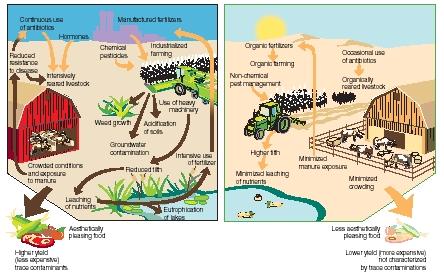
Positive effects of Industrial Agriculture:
Negative effects of Industrial Agriculture:
As modern farming techniques were introduced , this established the bedrock of rapid economic growth, food security and poverty. Using Industrial agriculture techniques, destroys soil tilth by the use of heavy machinery, which compacts the soil. Very little organic material is added to the soil thus decreasing the amount of nutrients that are naturally produced. Instead, inorganic nutrients are added directly to the soil in the form of synthetic fertilizers, which are manufactured from raw materials. These fertilizers are often applied at an excessive rate. As a result, they pass through the soil to contaminate groundwater and flow along the surface of soil to pollute surrounding bodies of water, threatening native species. In Industrial Agriculture, Livestock animals are generally kept together under extremely crowded and foul conditions. Because of this, they are highly susceptible to diseases and infections. In the United States animals with cancer are still deemed healthy to be slaughtered and served throughout the country. Conventional farmers rely on antibiotics, which are given not only when animals are sick but often on a continued basis in the animals' feed. Industrial farms, also called factory farms or CAFOs (confined animal feeding operations) pollute the air in many ways, emitting foul odours, airborne particles, greenhouse gases, and numerous toxic chemicals.
what about our Biodiversity?:

I hope this information has opened your eyes, to the food that you eat and how is got unto your plate. I believe that Sustainable Agriculture is the right way to go. Just like Industrial Agriculture it can still meet the needs of our growing population without sacrificing our environment and biodiversity. You can eat your food knowing that it is healthy and not raised in captivated, unsanitary areas, you will also be getting all the nutrients you need from naturally grown crops. Yet for the transition to be made, we all need to make a choice. what will yours be?